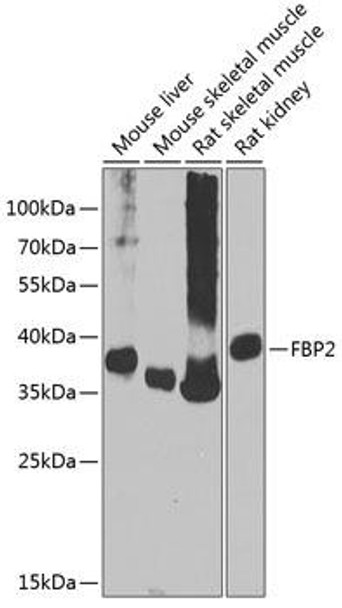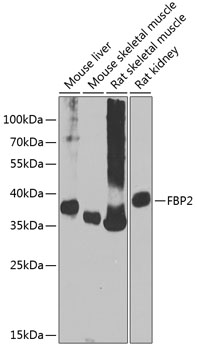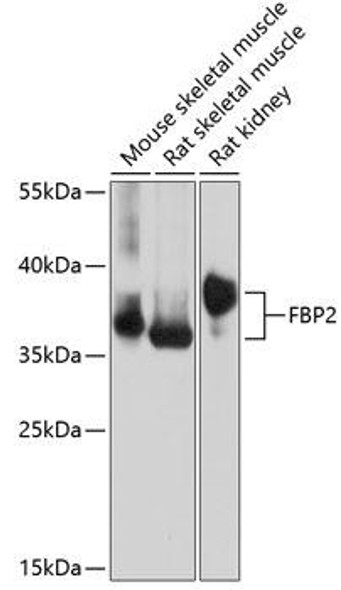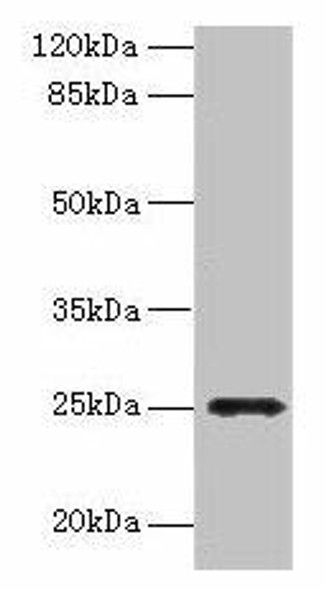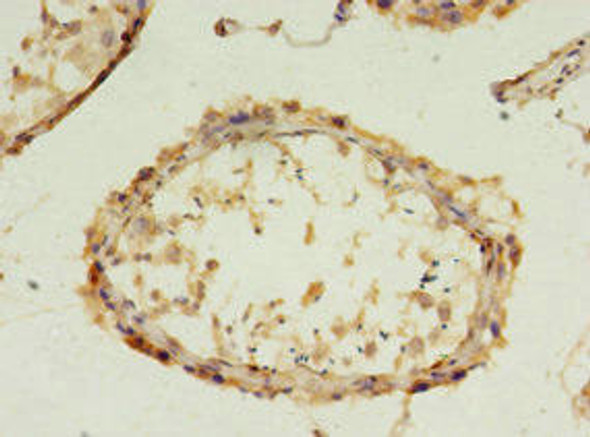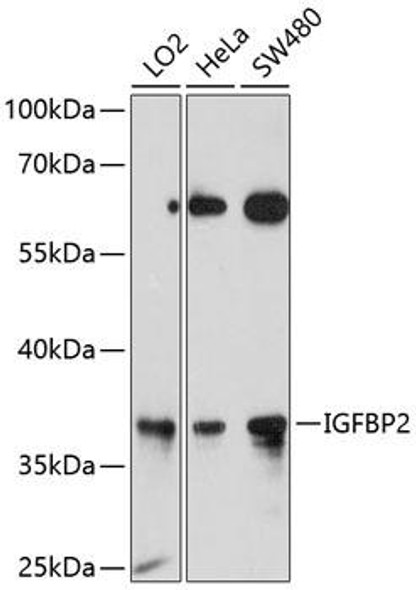Anti-FBP2 Antibody (CAB9850)
- SKU:
- CAB9850
- Product Type:
- Antibody
- Applications:
- WB
- Reactivity:
- Mouse
- Rat
- Host Species:
- Rabbit
- Isotype:
- IgG
- Research Area:
- Metabolism
Description
Anti-FBP2 Antibody (CAB9850)
The FBP2 Polyclonal Antibody (CAB9850) is a valuable tool for researchers studying FBP2, a key player in metabolic regulation. This antibody, produced in rabbits, exhibits high specificity for human samples and is optimized for use in Western blot applications. By binding to the FBP2 protein, it enables researchers to detect and analyze FBP2 expression in various cell types, making it a versatile tool for studies in metabolism and cancer research.FBP2, also known as fructose-1,6-bisphosphatase 2, plays a crucial role in gluconeogenesis, the process by which glucose is synthesized from non-carbohydrate precursors.
Dysregulation of FBP2 has been implicated in metabolic disorders such as diabetes and cancer. By understanding the function and regulation of FBP2, researchers can gain insights into the underlying mechanisms of these diseases and potentially identify new therapeutic targets for intervention.
| Antibody Name: | Anti-FBP2 Antibody |
| Antibody SKU: | CAB9850 |
| Antibody Size: | 20uL, 50uL, 100uL |
| Application: | WB |
| Reactivity: | Mouse, Rat |
| Host Species: | Rabbit |
| Immunogen: | Recombinant fusion protein containing a sequence corresponding to amino acids 1-339 of human FBP2 (NP_003828.2). |
| Application: | WB |
| Recommended Dilution: | WB 1:500 - 1:2000 |
| Reactivity: | Mouse, Rat |
| Positive Samples: | Mouse liver, Mouse skeletal muscle, Rat skeletal muscle, Rat kidney |
| Immunogen: | Recombinant fusion protein containing a sequence corresponding to amino acids 1-339 of human FBP2 (NP_003828.2). |
| Purification Method: | Affinity purification |
| Storage Buffer: | Store at -20'C. Avoid freeze / thaw cycles. Buffer: PBS with 0.02% sodium azide, 50% glycerol, pH7.3. |
| Isotype: | IgG |
| Sequence: | MTDR SPFE TDML TLTR YVME KGRQ AKGT GELT QLLN SMLT AIKA ISSA VRKA GLAH LYGI AGSV NVTG DEVK KLDV LSNS LVIN MVQS SYST CVLV SEEN KDAI ITAK EKRG KYVV CFDP LDGS SNID CLAS IGTI FAIY RKTS EDEP SEKD ALQC GRNI VAAG YALY GSAT LVAL STGQ GVDL FMLD PALG EFVL VEKD VKIK KKGK IYSL NEGY AKYF DAAT TEYV QKKK FPED GSAP YGAR YVGS MVAD VHRT LVYG GIFL YPAN QKSP KGKL RLLY ECNP VAYI IEQA GGLA TTGT QPVL DVKP EAIH QRVP LILG SPED VQEY LTCV QKNQ AGS |
| Gene ID: | 8789 |
| Uniprot: | O00757 |
| Cellular Location: | Cell junction, Cytoplasm, Nucleus, Z line, myofibril, sarcomere |
| Calculated MW: | 36kDa |
| Observed MW: | 36kDa |
| Synonyms: | FBP2 |
| Background: | This gene encodes a gluconeogenesis regulatory enzyme which catalyzes the hydrolysis of fructose 1, 6-bisphosphate to fructose 6-phosphate and inorganic phosphate. |
| UniProt Protein Function: | FBPase 2: a key enzyme of gluconeogenesis that catalyzes the hydrolysis of fructose 1,6-bisphosphate to fructose 6-phosphate, a precursor to glucose 6-phosphate. A regulator of glucose synthesis from non-carbohydrates. Two paralogs of this enzyme exists in humans: FBP1 is expressed in the liver and gluconeogenic tissues, and FBP2 in striated muscle. FBP2 is only isozyme expressed in striated muscle and it is widely expressed in cells that are nongluconeogenic. Both forms are inhibited allosterically by AMP, NAD and Ca2+. The muscle form is about 100-fold more sensitive to AMP and NAD, and about 1000-fold more sensitive to inhibition by Ca2+, the major activator of glycolysis in striated muscle. Forms an active complex with aldolase that binds to the sarcomeric Z-line, which is disrupted by elevated calcium levels, blocking glycogen synthesis during exercise. Forms homotetramers that are stabilized in the active state by divalent cations (Mg2+, Mn2+ , Co+2, or Zn2+). Its interaction with aldolase appears to desensitizes it to inhibition by AMP and, partially, by Ca2+. Up to 50% of lactate generated in striated muscle is converted to glycogen. |
| UniProt Protein Details: | Protein type:EC 3.1.3.11; Carbohydrate Metabolism - pentose phosphate pathway; Phosphatase (non-protein); Carbohydrate Metabolism - glycolysis and gluconeogenesis; Carbohydrate Metabolism - fructose and mannose Chromosomal Location of Human Ortholog: 9q22.3 Cellular Component: cytosol Molecular Function:fructose-bisphosphatase activity; protein binding Biological Process: fructose metabolic process; gluconeogenesis |
| NCBI Summary: | This gene encodes a gluconeogenesis regulatory enzyme which catalyzes the hydrolysis of fructose 1,6-bisphosphate to fructose 6-phosphate and inorganic phosphate. [provided by RefSeq, Jul 2008] |
| UniProt Code: | O00757 |
| NCBI GenInfo Identifier: | 76789651 |
| NCBI Gene ID: | 8789 |
| NCBI Accession: | O00757.2 |
| UniProt Secondary Accession: | O00757,Q17R39, Q6FI53, |
| UniProt Related Accession: | O00757 |
| Molecular Weight: | 36,743 Da |
| NCBI Full Name: | Fructose-1,6-bisphosphatase isozyme 2 |
| NCBI Synonym Full Names: | fructose-bisphosphatase 2 |
| NCBI Official Symbol: | FBP2 |
| NCBI Protein Information: | fructose-1,6-bisphosphatase isozyme 2 |
| UniProt Protein Name: | Fructose-1,6-bisphosphatase isozyme 2 |
| UniProt Synonym Protein Names: | D-fructose-1,6-bisphosphate 1-phosphohydrolase 2; Muscle FBPase |
| Protein Family: | Fat body protein |
| UniProt Gene Name: | FBP2 |
| UniProt Entry Name: | F16P2_HUMAN |

